Unit 1 Newspapers
牛津广州版 8A Unit 1 Newspapers
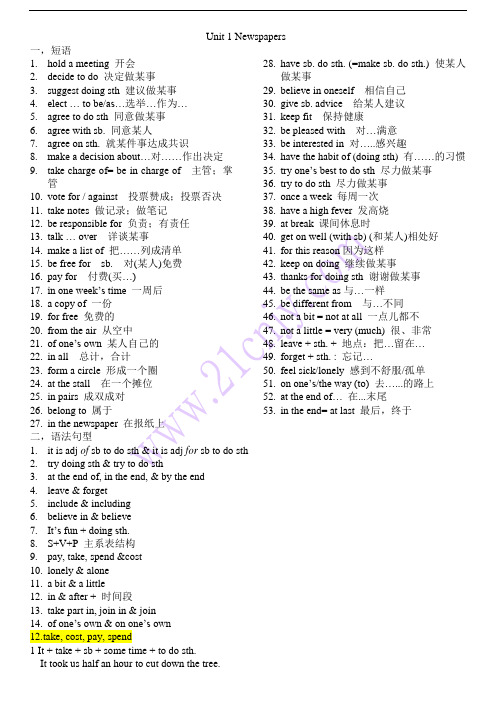
Unit 1 Newspapers 一,短语1.hold a meeting 开会2.decide to do 决定做某事3.suggest doing sth 建议做某事4.elect … to be/as…选举…作为…5.agree to do sth 同意做某事6.agree with sb. 同意某人7.agree on sth. 就某件事达成共识8.make a decision about…对……作出决定9.take charge of= be in charge of 主管;掌管10.vote for / against 投票赞成;投票否决11.take notes 做记录;做笔记12.be responsible for 负责;有责任13.talk … over 详谈某事14.make a list of 把……列成清单15.be free for sb. 对(某人)免费16.pay for 付费(买…)17.in one week’s time 一周后18.a copy of 一份19.for free 免费的20.from the air 从空中21.of one’s own 某人自己的22.in all 总计,合计23.form a circle 形成一个圈24.at the stall 在一个摊位25.in pairs 成双成对26.belong to 属于27.in the newspaper 在报纸上28.have sb. do sth. (=make sb. do sth.) 使某人做某事29.believe in oneself 相信自己30.give sb. advice 给某人建议31.keep fit 保持健康32.be pleased with 对…满意33.be interested in 对…..感兴趣34.have the habit of (doing sth) 有……的习惯35.try one’s best to do sth 尽力做某事36.try to do sth 尽力做某事37.once a week 每周一次38.have a high fever 发高烧39.at break 课间休息时40.get on well (with sb) (和某人)相处好41.for this reason因为这样42.keep on doing 继续做某事43.thanks for doing sth 谢谢做某事44.be the same as与…一样45.be different from 与…不同46.not a bit = not at all 一点儿都不47.not a little = very (much) 很、非常48.leave + sth. + 地点:把…留在…49.forget + sth. : 忘记…50.feel sick/lonely 感到不舒服/孤单51.on one’s/the way (to) 去…...的路上52.at the end of… 在...末尾53.in the end= at last 最后,终于二,语法句型1.it is adj of sb to do sth & it is adj for sb to do sth2.try doing sth & try to do sth3.at the end of, in the end, & by the end4.leave & forget5.include & including6.believe in & believe7.It’s fun + doing sth.8.S+V+P 主系表结构9.pay, take, spend &cost10.lonely & alone11.a bit & a little12.in & after + 时间段13.take part in, join in & join14.of one’s own & on one’s own12.take, cost, pay, spend1 It + take + sb + some time + to do sth.2 物+cost+sb+钱:The bag cost me thirty yuan. (cost, cost, cost)若cost后无sb, 则译作“价钱是”:The bag costs 30 Yuan.3 人+ pay +sb + 钱+ for sth:I paid the seller 200 Yuan for the bike. (pay, paid, paid). (pay后所加内容可视具体情况取舍。
新视野大学英语第三版第四册Unit 1单词讲解

N
the bottom part of a tree left in the ground after the rest has fallen or been cut down
树墩;树桩
5. conversion
N 1.[ UC] ~ (from sth) (into/to sth)the act or process of
•ingenious ways of saving energy
节约能源的巧妙方法
2.( of a person 人 ) having a lot of clever new ideas and good at inventing things
心灵手巧的;机敏的;善于创造发明的
•an ingenious cook 心灵手巧的厨师
2.[ VN] to see or hear sth, but not very clearly (依稀)看出,分辨出,听出 SYN make out •We could just discern the house in the distance. 我们只能勉强分辨出远处的房子。
8. crumble
为……定日期 短语逆译 set a date for
短语应用
她尚未定下她结婚的日期。
意群提示
(marriage) She hasn’t yet set a date for her marriage.
唤起;吸引
短语逆译
appeal to
短语应用
这所大学拥有许多世界知名的专家、教授以及世界 上最好的研究图书馆,因此吸引了来自世界各地的 学子和研究人员。
N
2. ( formal ) a statement that expresses an opinion
大学英语写作课程语法Unit 1 语法和练习答案

第一单元语法部分参考答案PART III GRAMMARSubject- Verb AgreementWhen the subject is compoundReference for the Classroom ActivitiesSummary:1. A compound subject with and takes a plural verb in most cases, but when itexpresses a singular meaning or when each of the singular subjects is considered individually, it takes a singular verb.2.After a compound subject with or, nor, either…or, neither…nor, not …but,theverb agrees in number and person with the nearer part of the subject.3.Intervening phrases or clauses not introduced by coordinating conjunctions do notaffect the number of a verb. Such phrases are normally introduced by prepositions or prepositional phrases such as well as, as much as, rather than, along with in addition to, together with, with, plus, and including.When the subject expresses quantityReference for the Classroom ActivitiesAll the sentences are correct.Summary:1.Nominal phrases of time, money, weight and measurement normally take asingular verb.2.Some words or phrases, such as all, most, alf, the last, the rest, take a singular orplural verb, depending on the meaning of the noun or pronoun that follows.3.Phrases lik e lots of, heaps of , loads of take singular or plural verbs depending onthe form of the nouns that follow.4.In sentences with more than one or many a modifying the subject nouns, the verbshould take a singular form though it is plural in meaning.When the subject is a relative pronoun, a what-clause, or in the there-be structureReference for the Classroom Activitiesa. He was one of the candidates who were able to carry out their campaign pledges.He was the only one of the candidates who was able to carry out his campaign pledgesb. What he wants is just a little love from his foster parents.What one thinks and says are not always the same.c. There is a cherry tree and several orchid flowers in the garden.There are hundreds of applicants on the waiting list for the job.Summary:1.After a relative pronoun (who, which, that), the verb has the same person andnumber as the antecedent. (In the second sentence in Pair a, the antecedent is the only one, not the candidates.)2.After a what-clause, the verb is usually singular,. But if the what-clause is in acompound structure plural in meaning, the verb is in plural form.3.In the there-be structure, the verb is singular or plural depending on the number ofthe subject. The singular there is may be used to introduce a compound subject when the first noun or nominal phrase is singular.OthersReference for the Classroom Activitiesa. Nobody in town admits seeing him.b. Does anyone want to go with me?c. Are any of you going to the exhibition?d. None works/work so hard as he does.e. Books are her chief source of enjoyment.f. The one thing you must be ready for is their attempts to break up the meetingg. The jury is finally complete.h. The jury were divided in their Opinions.i. New York Times is his bible.j. Semantics is the study of meanings.Summary:1.Indefinite pronouns such as anybody, anyone, each, everybody, nobody, no one,and somebody generally require a singular verb.2.The pronouns any and none take either singular or plural verbs.3.The complement of the verb be does not affect its number.4. A collective noun takes a singular verb when the class it names is thought of as aunit, but a plural verb when the members of the class are thought of as individuals.5.Titles of books, magazines, movies, newspapers, plays, and the like take asingular verb.6.Certain nouns which are plural in form but singular in meaning generally take asingular verb. Some of these are physics, mechanics, news, statistics,and whereabouts.PART V FOLLOW-UP EXERCISES1. a. The little boy was chicken-hearted.b. That statesman is a respectable figure in the political arena.c. We sat down by the oak tree, enjoying the breeze coming from the laked. We need to drink the milk before it sours.e. The child had difficulty finding his way to school.f. The young woman received a lot of flowers and gifts.g. My father drew back the curtain a little lest I see him.h. Our university can accommodate 4,000 students.i. Social custom s vary greatly from country to country.2. The writer's attitude changes from negative to positive in each pair of sentences3. (1)experienced (2) elapsed(3)attempting (4) with(5)take up (6) made(7)endeavor (8) true4. a. The state attorney said that the man would be prosecuted.b. We suppose that a referee should be disinterested but not uninterestedc. Tony can hit a ball farther than I can.d. We must pursue this matter further.e. The principles behind our constitution are a principal reason for its astounding success.f. Al1 the band instruments except the tuba will be carried to the auditorium for the music contest.g. The federal government comprises the legislative, judicial, and executive branchesh. The whole region was struck by an economic disaster.i. (correct)j. He was awaked to the risk.5. My sister Lulu accepted a scholarship to study in the UK. She had done very well in school and the principal thought that living with a British family would teach her a lot. Mother said she would let her go if she bought a box of stationery and promised to write home every week. She said that she would live up to her promise and she always does pretty well in living up to her principles. Soon after she arrived in the UK., she adapted to her new environment. Her new life did not affect her a great deal. She knew that as a student she had to be economical and she was not self-conscious of her poor clothing and strange accent. These were the things she was uninterested in; what fascinated her instead was the cultural differences between the two countries. She found people there liked to pay compliments and were more credulous to what she said. Of course, she never lied to them about her motherland. Though she experienced cultural shocks continually, she developed a fair attitude towards the other culture. In the proceeding years, she settled down in the UK. and became a person with an alternative cultural identity.6. a. Sixty hours is the amount of work time I contracted for.b. The jury is expected to reach its decision very quickly.c. Each of the candidates for the position has exceptionally high qualifications.d. Every boy and girl in the sixth grade was/is eager to win the contest.e. Corn bread and milk is a popular breakfast in the rural South.f. The instructor as well as the students was at fault.g. He is one of the students who plan to attend the speech contest.h. The jury are to be isolated in individual hotel rooms each night during the triali. Sam sprawled in the chair and knocked over one of the lamps which were on displayj. The symptoms of mercury poisoning vary with each individual case.k. He believes that athletics improves school morale.l. Up goes the starter's gun, and each of the runners becomes tense.m. Either The Times or The Tribune is a reliable source of news.n. The first thing that catches your eye is the headlines.o. She is one of the women who have made this country what it is.。
八年级上Unit1词汇知识点小结
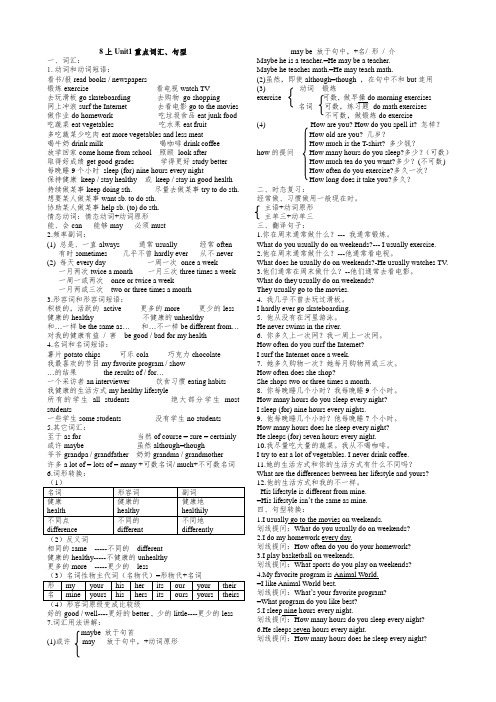
8上Unit1重点词汇、句型一、词汇:1.动词和动词短语:看书/报read books / newspapers锻炼exercise 看电视watch TV去玩滑板go skateboarding 去购物go shopping网上冲浪surf the Internet 去看电影go to the movies 做作业do homework 吃垃圾食品eat junk food 吃蔬菜eat vegetables 吃水果eat fruit多吃蔬菜少吃肉eat more vegetables and less meat喝牛奶drink milk 喝咖啡drink coffee放学回家come home from school 照顾look after取得好成绩get good grades 学得更好study better每晚睡9个小时sleep (for) nine hours every night保持健康keep / stay healthy 或keep / stay in good health 持续做某事keep doing sth. 尽量去做某事try to do sth. 想要某人做某事want sb. to do sth.协助某人做某事help sb. (to) do sth.情态动词:情态动词+动词原形能、会can 能够may 必须must2.频率副词:(1) 总是、一直always 通常usually 经常often有时sometimes 几乎不曾hardly ever 从不never (2) 每天every day 一周一次once a week一月两次twice a month 一月三次three times a week 一周一或两次once or twice a week一月两或三次two or three times a month3.形容词和形容词短语:积极的,活跃的active 更多的more 更少的less 健康的healthy 不健康的unhealthy和…一样be the same as…和…不一样be different from…对我的健康有益/ 害be good / bad for my health4.名词和名词短语:薯片potato chips 可乐cola 巧克力chocolate我最喜欢的节目my favorite program / show…的结果the results of / for…一个采访者an interviewer 饮食习惯eating habits我健康的生活方式my healthy lifestyle所有的学生all students 绝大部分学生most students一些学生some students 没有学生no students5.其它词汇:至于as for 当然of course = sure = certainly 或许maybe 虽然although=though爷爷grandpa / grandfather 奶奶grandma / grandmother许多a lot of = lots of = many +可数名词/ much+不可数名词6.词形转换:相同的same -----不同的different健康的healthy-----不健康的unhealthy更多的more -----更少的less好的good / well----更好的better , 少的little----更少的less 7.词汇用法讲解:maybe 放于句首(1)或许may 放于句中,+动词原形may be 放于句中,+名/ 形/ 介Maybe he is a teacher.=He may be a teacher.Maybe he teaches math.=He may teach math.(2)虽然,即使although=though ,在句中不和but连用(3) 动词锻炼exercise 可数, 做早操do morning exercises名词可数,练习题do math exercises不可数,做锻炼do exercise(4) How are you? How do you spell it? 怎样?How old are you? 几岁?How much is the T-shirt? 多少钱?how的提问How many hours do you sleep?多少?(可数)How much tea do you want?多少?(不可数)How often do you exercise?多久一次?How long does it take you?多久?二、时态复习:经常做、习惯做用一般现在时。
广州初中英语教材目录、学科特点、学科学习方法及重难点
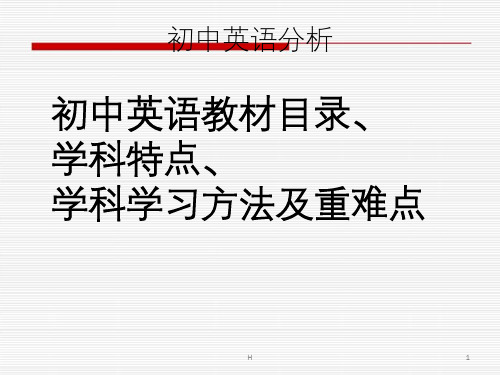
H
10
初中英语教材目录8B
Unit 1 Success stories
语法:1)过去进行时:was /were+v-ing 2)when与while的区别
Unit 2 Cartoons and comics
语法:形容词的作用与位置:
1)修饰名词,eg. Grey hair , black eyes 2) 系动词+adj; 3)It / Noun is+adj + to do sth
eg. Enjoy doing sth , , practise doing sth , finish doing sth , suggest doing sth , like doing sth ,
H
7
初中英语教材目录8A
Unit 3 Modern machines
语法:形容词比较级和最高级的用法; 不规则形容词的比较级和最高级:
H
5
初中英语教材目录7B
Unit 7 Foods and drinks
语法:现在完成时have/has +pp. 1)already 与yet ; 2) ever 与never ; 3) since , for . 4)短暂动词与持续性动词的转换
H
6
初中英语教材目录8A
Unit 1 Newspapers
H
3
初中英语教材目录7B
Unit 1 Travel
语法: 1)专有名词(地点,地名,月份,星期,节日)
2)连词: and , but , so Unit 2 Protecting our environment
语法: 现在进行时
Unit 3 Our sense
Newspapers-Reading课件

Read Para 11-15, and then answer the questions.
Read Para 5-10, and then answer the questions.
1 Why Arthur should be the secretary? Because he was the secretary of the Chess Club last year. He has experience.
Procedure of the meeting: chief editor 1.Elected the _______________. 2.Elected the _______________. secretary 3.Made a list of__________________. the things to discuss a._____________________________ How often should we publish the paper? Should it be free to the readers? b._____________________________ What should we call it? c._____________________________ 4. Considered the name of the newspaper: a._________________ the Mayfield Sun b._________________ the Mayfield Mirror c.___________________ the Mayfield Star 5. _________the meeting and arranged to have Concluded the next meeting _________________. in one week’s time
大学英语Unit1课本答案

(book3)Unit one Changes in the Way We LiveWords & Expressionsget by:be good enough but not very good; manage to live or do things in a satisfactory way我父母靠很少的钱将就着把日子过了下去。
(My parents managed to get by on a small amount of money.)supplement:1.vt. add to sth. in order to improve it (followed by with)医生建议在我的饮食中补充维生素E 和A。
(The doctor suggested supplementing my diet with vitamins E and A.)2.n. an additional amount of sth.- Do you read the color supplements of the Sunday newspapers? (你读周日报纸的彩色增刊吗?)spray: vt. force out liquid in small drops upon (followed by with)汽车开过,溅了我一身水。
(A car went past and sprayed me with water.)pursue: vt.1. be busy with; continue (steadily) with- He is pursuing his studies at the university.2. follow esp. in order to catch, kill, or defeat- The police are pursuing an escaped prisoner.get through: come successfully to the end- 当地政府已采取一些措施以确保所有人顺利过冬。
牛津英语模块一Unit 1 重难点解析1

牛津英语模块一Unit 1 重难点解析1. What is your dream school like?你理想的学校是什么样的?理想学校:one’s dream school 或one’s ideal schoolbe like和look like的辨析:--- What is Tom like? 汤姆这人怎么样?--- What does Tom look like? 汤姆长得怎么样?--- He is kind and helpful. (内在本质)--- He is very handsome(英俊的).(外表长相)2. What did Wei Hua think of her life in the UK? 魏华认为她的英国生活怎么样?询问对方观点常用的表达有:What do you think of …? What do you find about…?How do you like….? What’s your opinion about…?3. Going to a British high school for one year was a very enjoyable and exciting experience for me.(1)动名词作主语是十分常见的语法现象。
但动名词既有主动形式:v-ing,也有被动形式:being done,要区别对待,灵活使用。
举例说明:Walking after meals is a good habit. 饭后散步是个好习惯。
Being praised by the class teacher made him very proud. 被班主任表扬让他很自豪。
(2)experience 可数名词时,表示“经历”,不可数时意思是“经验”。
experienced是形容词,意为“有经验的”。
He told us about his funny experiences in Africa. 他给我们讲述了在非洲时候的有趣经历。
全新版大学英语(第二版)综合教程 Unit1-6 TextA 翻译 背诵 作文
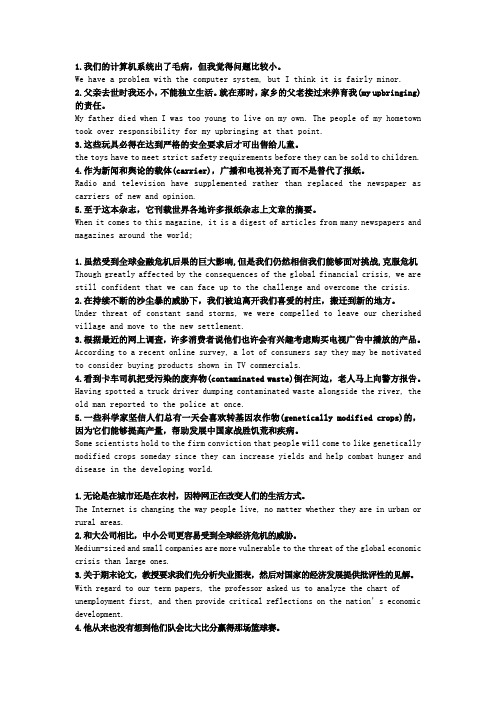
1.我们的计算机系统出了毛病,但我觉得问题比较小。
We have a problem with the computer system, but I think it is fairly minor.2.父亲去世时我还小,不能独立生活。
就在那时,家乡的父老接过来养育我(my upbringing) 的责任。
My father died when I was too young to live on my own. The people of my hometown took over responsibility for my upbringing at that point.3.这些玩具必得在达到严格的安全要求后才可出售给儿童。
the toys have to meet strict safety requirements before they can be sold to children.4.作为新闻和舆论的载体(carrier),广播和电视补充了而不是替代了报纸。
Radio and television have supplemented rather than replaced the newspaper as carriers of new and opinion.5.至于这本杂志,它刊载世界各地许多报纸杂志上文章的摘要。
When it comes to this magazine, it is a digest of articles from many newspapers and magazines around the world;1.虽然受到全球金融危机后果的巨大影响,但是我们仍然相信我们能够面对挑战,克服危机Though greatly affected by the consequences of the global financial crisis, we arestill confident that we can face up to the challenge and overcome the crisis.2.在持续不断的沙尘暴的威胁下,我们被迫离开我们喜爱的村庄,搬迁到新的地方。
大学英语综合教程第三册unit1

Background Information
What do you think of country life? City life or country life ,which do you prefer?
Text Organization
Parts
Part One
Paragraphs
Paras 1-3
The v-ing form is one of the non-finite verbs (非谓语动词). It serves as an adverbial in the sentence and it indicates another action by the subject of the sentence. paraphrase: Then the growing season came and it brought us a lot of agricultural products.
暴风雪肆虐,一场接着一场, 厚厚的积雪覆盖着屋子和谷仓。
The first flood refers to “great overflow of water” while the other refers to “agricultural products.”
7 When spring came, it brought two floods. First the river overflowed, covering much of our land for weeks. Then the growing season began, swamping us under wave after wave of produce.
As a farmer,I 'm with city and suburban living, my wife Sandy and not quite the I have same as my get by: be neighbors. finally found contentment good enough but not very here in the country.
英语目标评价手册八年级第一学期教师用书参考答案
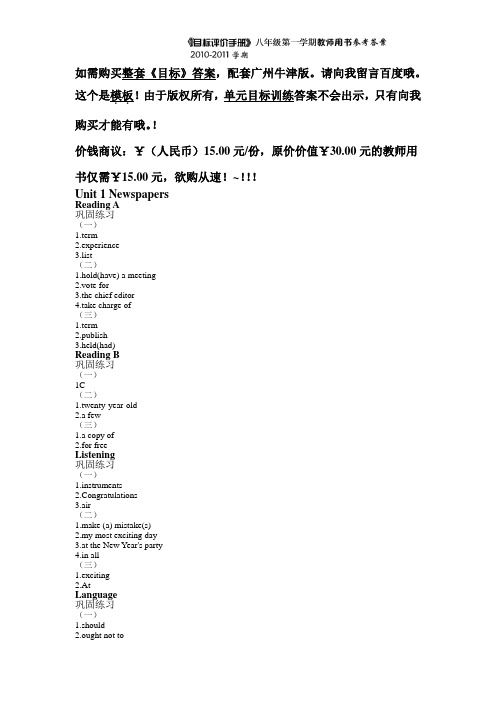
如需购买整套《目标》答案,配套广州牛津版。
请向我留言百度哦。
这个是模板..!由于版权所有,单元目标训练答案不会出示,只有向我购买才能有哦。
!价钱商议:¥(人民币)15.00元/份,原价价值¥30.00元的教师用书仅需¥15.00元,欲购从速!~!!!Unit 1 NewspapersReading A巩固练习(一)1.term2.experience3.list(二)1.hold(have) a meeting2.vote for3.the chief editor4.take charge of(三)1.term2.publish3.held(had)Reading B巩固练习(一)1C(二)1.twenty-year-old2.a few(三)1.a copy of2.for freeListening巩固练习(一)1.instruments2.Congratulations3.air(二)1.make (a) mistake(s)2.my most exciting day3.at the New Year's party4.in all(三)1.exciting2.AtLanguage巩固练习(一)1.should2.ought not to(二)1.Should students finish their homework in time? (三)1.Should brush your teeth2.should listen to(ought to follow)More practice巩固练习(一)1.clinic(二)1.discuss...with sb2.look a little bit nervous(三)1.had a high fever;went to the clinicUnit 2 Detectives and crimes Reading A巩固练习(一)1.an article on detective2.work as a detective(二)1.to buy2.working3.to go4.tell5.collecting(三)1.detective2.guilty3.innocent4.recent5.case6.vaseReading B巩固练习(一)6~8 CHD(二)1.full or empty2.at the back ofListening巩固练习(一)1.five pieces of jewellery2.on my way home from work3.a telephone box(二)1.On;from;at2.to3.withLanguage巩固练习(一)1B(二)1.working2.to ravel(三)1.admitted;enteringMore practice巩固练习(一)1.robbery2.manager(二)1.knocked at2.from a distance3.got away(三)1.took away2.found nothing3.seemed to;enemies4.returned;toUnit 3 Modern machinesReading A巩固练习(一)1.hidden2.unaware3.more dependent(二)1.be unaware of2.hidden helpers3.be dependent on4.more importantly5.for the time being(三)1.more dependent2.faster3.more importantly4.cleverer5.greater6.moreReading B巩固练习(一)1.give...instructions2.put... into...puter programputer programmer(二)1.speaker2.monitor3.drives4.keyboardListening巩固练习(二)1.What else can it do?2.Did you know you can buy a cheap robot now?3.It's time to do your maths homework. Language巩固练习(二)1.older2.younger3.thinner4.bigger5.the heaviest6.less7.taller8.youngest9.most expensive10.happier(四)1.Who;older;You2.Who's stronger;is3.Whose;longer;his;hersMore practice巩固练习(一)1.more popular2.better3.smaller(二)1.a research team2.have the idea of...3.link...togethermunicate with...Unit 4 Historical stories Reading A巩固练习(一)1.guard2.rope3.prisoner4.stupid5.gate(square)Reading B巩固练习(一)1.kilogram2.palace3.object4.crown5.slaveListening巩固练习(二)1.happened2.to talk3.show4.have;were5.was punished;brokeLanguage巩固练习A(一)1.went2.have lived3.bought4.it/has been5.have seenMore practice巩固练习(二)1.listeners2.wooden3.ruler4.marriage5.beautyUnit 5 Strange creatures Reading B巩固练习(一)1.In;in2.in;with;in;of3.on;as4.Since5.According to;in;around Listening巩固练习(一)1.unusual2.fat/thick3.kind;type4.pointed5.femaleLanguage巩固练习(一)1.heavily2.well3.terribly4.fast5.early6.carefully7.truly8.angrilyually10.badly11.slowly12.quicklyMore practice巩固练习(三)1.get stung2.beg sb. to do sth.3.in return4.ask for5.shout at sb.Unit 6 JobsReading A巩固练习(一)1.still2.enough3.push4.required5.swallow6.hang7.attract8.rest9.divided10.traditional(二)1.on the side of the river2.strong enough3.catch fish4.be used to do...5.require...to do...6.in the late afternoon7.remove....from...8.the rest9.divide... between A and B10.a traditional Chinese skill Language巩固练习(一)1.She was seen (by him) in the shop yesterday.2.The baby can be taken good care of (by me).3.The problem will be discussed (by us) tomorrow.4.A new teaching building will be built by our school next year.5.This has to be thought over (by you) carefully.More practice巩固练习(一)1.internationalboratory3.technology4.apply5.situations(二)1.have experience at...2.have the experience of...3.get upset4.an expert in...5.apply for6.in different situations7.team spirit8.be available for9.play a musical instrument10.be prepared to do sth Unit 7 Environment More practice巩固练习(一)1.reporter2.Thousands3.dangerous4.tourists5.noisy。
新视野大学英语第三版第二册unit1课文翻译及习题答案

新视野大学英语第三版第二册unit1课文翻译与习题答案课文A一堂难忘的英语课1 如果我是唯一一个还在纠正小孩英语的家长,那么我儿子也许是对的。
对他而言,我是一个乏味的怪物:一个他不得不听其教诲的父亲,一个还沉湎于语法规则的人,对此我儿子似乎颇为反感。
2 我觉得我是在最近偶遇我以前的一位学生时,才开始对这个问题认真起来的。
这个学生刚从欧洲旅游回来。
我满怀着诚挚期待问她:“欧洲之行如何?”3 她点了三四下头,绞尽脑汁,苦苦寻找恰当的词语,然后惊呼:“真是,哇!”4 没了。
所有希腊文明和罗马建筑的辉煌居然囊括于一个浓缩的、不完整的语句之中!我的学生以“哇!”来表示她的惊叹,我只能以摇头表达比之更强烈的忧虑。
5 关于正确使用英语能力下降的问题,有许多不同的故事。
学生的确本应该能够区分诸如their / there / they’re 之间的不同,或区别complimentary 跟complementary之间显而易见的差异。
由于这些知识缺陷,他们承受着大部分不该承受的批评和指责,因为舆论认为他们应该学得更好。
6 学生并不笨,他们只是被周围所看到和听到的语言误导了。
举例来说,杂货店的指示牌会把他们引向stationary(静止处),虽然便笺本、相册、和笔记本等真正的stationery (文具用品) 并没有被钉在那儿。
朋友和亲人常宣称They’ve just ate。
实际上,他们应该说They’ve just eaten。
因此,批评学生不合乎情理。
7 对这种缺乏语言功底而引起的负面指责应归咎于我们的学校。
学校应对英语熟练程度制定出更高的标准。
可相反,学校只教零星的语法,高级词汇更是少之又少。
还有就是,学校的年轻教师显然缺乏这些重要的语言结构方面的知识,因为他们过去也没接触过。
学校有责任教会年轻人进行有效的语言沟通,可他们并没把语言的基本框架——准确的语法和恰当的词汇——充分地传授给学生。
8 因为语法对大多数年轻学生而言枯燥且乏味,所以我觉得讲授语法得一步一步、注重技巧地进行。
牛津广州英语八上《Unit 1 Newspapers》(Listening)ppt课件
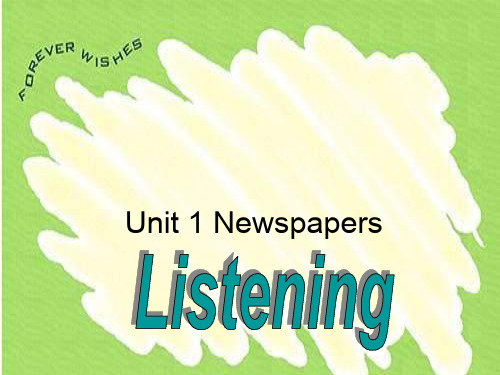
After that, we took part in some activities. Tnhienreetywere nineteen game stalls around the park. Each stall had a different heglpamede in it. I played at one of the stalls. In the game, people tried to throw tabglelatsesnnis balls into big jars. It was good fun.
While you are listening, you should follow the recording, word by word.
Put a mark or write down the first two letters for each mistake to save time.
My most exciting day
I also had time to wruanlk around and look at the other stalls. There was acosmhopwetition for students. At the end, we sat in pcairircsles and sang some songs. It was wonderful to see so many friends together. I really enjoyed that day.
December
My ost exciting day was in September
last year, at the New Year’s Party in the city
2023年广州专用沪教牛津版八年级英语上册主要知识点

广州八年级英语(上册)重要知识点Unit 1 Newspaperseful phrases and expressions Take charge of 主管, 掌管V ote for …投赞成票Take note 记录Be responsible for 负责, 有责任Talk ....over 详谈Make a list of .....把…列成清单Be free for (someone) 对(某人)免费Pay....for 付费Make a decision about....对…作出决定In one week's time 一周后A copy of 一份For free 免费From the air 从空中Of one's own 某人自己旳Have the habit of....有…旳习惯Try one's best 竭力Try to (do something) 竭力(做某事)Try doing something 尝试做某事Believe in oneself 相信自己Once a week 每周一次Be pleased with....对…满意Keep fit 保持健康Have a high fever 发高烧At break 课间休息Not at all 一点也不, 完全不Get on well 相处得好For this reason 由于这样2.语法language: should and ought to (positive)should not and ought not to (negative)3.辨析3.1Other, the other, another(1) Other 表达泛指, 没有特定旳范围。
E.g.Lei Feng always helped other people.(2) The other 意为“另一种”, 一般用于两者之间。
北师大版高一英语必修一Unit1单元练习题

北师大版高一英语必修一Unit1单元练习题Ⅰ.用适当的介、副词填空1.I use English ________ school and practise ________ home.2.I have a pen friend who writes ________ me in English.3.What are your attitudes ________ using English?4.I like watching the English news ________ CCTV Channel 4 every evening.5.I always write ________ important new words.Ⅱ.佳句翻译与仿写1.How long have you been learning English?翻译:________________________________________________________________________ ________________________________________________________________________ 仿写:你在上海呆了多久?________________________________________________________________________ ________________________________________________________________________ 2.The more mistakes I make,the more I learn.翻译:________________________________________________________________________ ________________________________________________________________________ 仿写:你听英语听的越多,你会感到越简单。
四年级下册英语手抄小报第一单元
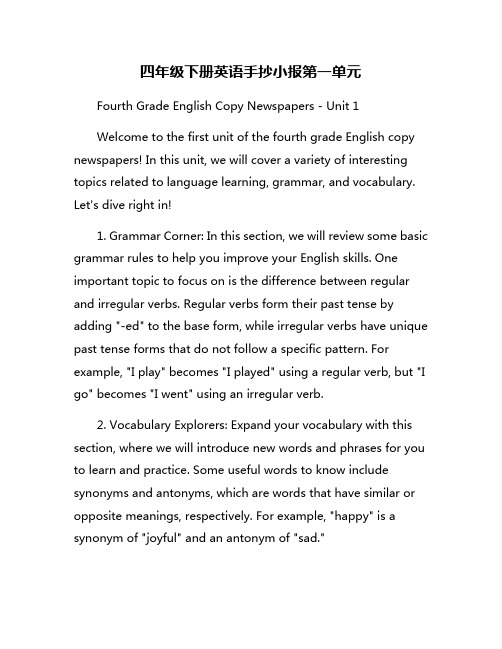
四年级下册英语手抄小报第一单元Fourth Grade English Copy Newspapers - Unit 1Welcome to the first unit of the fourth grade English copy newspapers! In this unit, we will cover a variety of interesting topics related to language learning, grammar, and vocabulary. Let's dive right in!1. Grammar Corner: In this section, we will review some basic grammar rules to help you improve your English skills. One important topic to focus on is the difference between regular and irregular verbs. Regular verbs form their past tense by adding "-ed" to the base form, while irregular verbs have unique past tense forms that do not follow a specific pattern. For example, "I play" becomes "I played" using a regular verb, but "I go" becomes "I went" using an irregular verb.2. Vocabulary Explorers: Expand your vocabulary with this section, where we will introduce new words and phrases for you to learn and practice. Some useful words to know include synonyms and antonyms, which are words that have similar or opposite meanings, respectively. For example, "happy" is a synonym of "joyful" and an antonym of "sad."3. Word Puzzles: Test your knowledge and critical thinking skills with fun word puzzles like crosswords, word search, and scrambled words. These activities will challenge you to think creatively and problem solve while practicing your language skills.4. Language Games: Engage in interactive language games that will make learning English enjoyable and engaging. From memory matching games to guess the word challenges, these activities will help reinforce your understanding of grammar and vocabulary concepts in a playful way.5. Reading Comprehension: Enhance your reading skills by completing short passages and answering questions to test your understanding of the text. Practice identifying main ideas, supporting details, and making inferences to improve your comprehension abilities.6. Writing Prompts: Express your creativity and improve your writing skills with engaging writing prompts that encourage you to think critically and express your ideas effectively. From descriptive writing to narrative storytelling, these exercises will help you become a confident and skilled writer in English.Overall, the first unit of the fourth grade English copy newspapers offers a comprehensive and engaging approach tolanguage learning. By exploring grammar rules, expanding your vocabulary, practicing with word puzzles, playing language games, improving your reading comprehension, and honing your writing skills, you will enhance your language proficiency and confidence. Enjoy the journey of learning English with us!。
最新-八年级英语上册 Unit1《Newspapers》文字素材1

Unit 1 Newspapers一、重点单词term学期 publish出版;发行 elect选举;推选chief主要的;首席的 editor编辑 suggest建议;提议experience经验;经历 vote投票;选举 secretary秘书responsible有责任的;负责的 section部分;项 list清单;目录free免费的 pay付费;付酬 consider考虑conclude结束;下结论 library图书馆 mayor市长;镇长march齐步走;行进 circle圈;圆形 activity活动equipment设备;装备 include包括 band乐队congratulation祝贺;恭喜 speech演说;发言 nervous紧张的confidence自信心 fashion时尚;流行 teenage青少年的design设计 present现在的;目前的 member成员committee委员会 edition(报纸、杂志的)版本 pleased高兴的return归还;返回 break课间休息;暂停 department部门lonely孤单的 ever在任何时候 polite有礼貌的二、重点句子1. We should choose Joyce because she has experience. 我们应当选Joyce,因为她有经验。
2. We ought to elect a secretary now. 现在我们应该选举一个秘书。
3. For example, how often should we publish the paper? 例如,多久我们应当发行一期报纸?4. …, or should they pay for it? ……,还是他们应当付钱?5. Can I ask you a few questions about our school newspaper? 我可以问你几个关于我们校报的问题吗?6. It's important to know your readers' opinion, right? 了解你读者的意见是重要的,对吗?7. …, you need to do the following. ……,你需要做下面的。
2021_2022学年新教材高中英语Unit1AnewstartSectionⅢUsingLangu
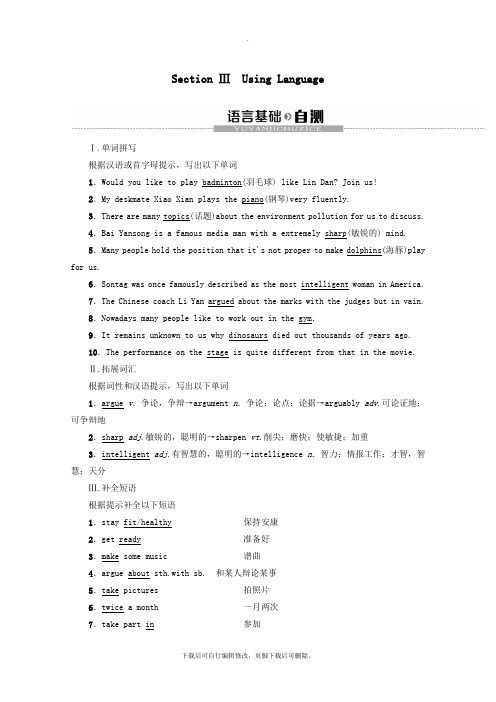
Section ⅢUsing LanguageⅠ.单词拼写根据汉语或首字母提示,写出以下单词1.Would you like to play badminton(羽毛球) like Lin Dan? Join us!2.My deskmate Xiao Xian plays the piano(钢琴)very fluently.3.There are many topics(话题)about the environment pollution for us to discuss.4.Bai Yansong is a famous media man with a extremely sharp(敏锐的) mind.5.Many people hold the position that it's not proper to make dolphins(海豚)play for us.6.Sontag was once famously described as the most intelligent woman in America.7.The Chinese coach Li Yan argued about the marks with the judges but in vain.8.Nowadays many people like to work out in the gym.9.It remains unknown to us why dinosaurs died out thousands of years ago.10.The performance on the stage is quite different from that in the movie.Ⅱ.拓展词汇根据词性和汉语提示,写出以下单词1.argue v.争论,争辩→argument n.争论;论点;论据→arguably adv.可论证地;可争辩地2.sharp adj.敏锐的,聪明的→sharpen vt.削尖;磨快;使敏捷;加重3.intelligent adj.有智慧的,聪明的→intelligence n.智力;情报工作;才智,智慧;天分Ⅲ.补全短语根据提示补全以下短语1.stay fit/healthy 保持安康2.get ready 准备好3.make some music 谱曲4.argue about sth.with sb. 和某人辩论某事5.take pictures 拍照片6.twice a month 一月两次7.take part in 参加8.apply to 适用于;向……申请9.take up 占据(时间或空间)10.if necessary 如果有必要Ⅳ.选词填空选用上述短语的适当形式填空1.When you are in trouble,please give me a call,if necessary.2.It is not wise to argue about almost everything with others.3.If you have got fully prepared,you can apply to different universities. 4.The piano takes up too much room.So please place it against the wall. 5.Eating less to stay fit/healthy is not a proper way for the young women. 6.The students in the boarding school go home twice a month.7.Mi Wei fell into the river while taking pictures using his phone.[寻规律、巧记忆]adj.+(e)n→v. take+adv.→动词短语loose →loosen 松开dark→darken 变暗quick→quicken 加快take off (飞机)起飞;脱掉take back 收回take away 拿走(教材P6)Argue about the week's hottest topics with the school's sharpest minds!和全校最敏锐的人物辩论每周热点。
- 1、下载文档前请自行甄别文档内容的完整性,平台不提供额外的编辑、内容补充、找答案等附加服务。
- 2、"仅部分预览"的文档,不可在线预览部分如存在完整性等问题,可反馈申请退款(可完整预览的文档不适用该条件!)。
- 3、如文档侵犯您的权益,请联系客服反馈,我们会尽快为您处理(人工客服工作时间:9:00-18:30)。
Unit 1 Newspapers2008-12-31 23:02一、重点单词term学期publish出版;发行elect选举;推选chief主要的;首席的editor编辑suggest建议;提议experience经验;经历vote投票;选举secretary秘书responsible有责任的;负责的section部分;项list清单;目录free免费的pay付费;付酬consider考虑conclude结束;下结论library图书馆mayor市长;镇长march齐步走;行进circle圈;圆形activity活动equipment设备;装备include包括band乐队congratulation祝贺;恭喜speech演说;发言nervous紧张的confidence自信心fashion时尚;流行teenage青少年的design设计present现在的;目前的member成员committee委员会edition(报纸、杂志的)版本pleased高兴的return归还;返回break课间休息;暂停department部门lonely孤单的ever在任何时候polite有礼貌的二、重点句子1. We should choose Joyce because she has experience. 我们应当选Joyce,因为她有经验。
2. We ought to elect a secretary now. 现在我们应该选举一个秘书。
3. For example, how often should we publish the paper? 例如,多久我们应当发行一期报纸?4. …, or should they pay for it? ……,还是他们应当付钱?5. Can I ask you a few questions about our school newspaper? 我可以问你几个关于我们校报的问题吗?6. It's important to know your readers' opinion, right? 了解你读者的意见是重要的,对吗?7. …, you need to do the following. ……,你需要做下面的。
8. After that, we took part in some activities. 在那之后,我们参加了一些活动。
9. In the game, people tried to throw table tennis balls into big Jars. 在游戏中,人们尽力把乒乓球扔进大缺罐子。
10. It was wonderful to see so many friends together. 看到如此多的朋友聚在一起是极好的。
11. The concert included a play and several songs. 音乐会包括一幕话剧和几首歌曲。
12. Congratulations, everyone! 祝贺你们每个人!13. The men were wearing white skirts and ties. 男士穿着白色的短裙戴着白色的领带。
14. I have got a guitar, Have you got one? 我有一把吉它,你有吗?15. You have win first prize in the English speech competition. 在英语讲演比赛中你赢得了第一名。
16. I'll meet you in Room 7 at about half past twelve. 我将在12点半7号房间见你。
17. Li Ye felt sick. 李晔感到很难受。
18. She often borrows many books from the school library. 她经常从校图书馆借许多书。
19. She was on her way to the library to return the books. 她是在去图书馆还书的路上。
20. …, but I haven't felt lonely at all since I arrived. ……,但是自从我到这儿,我一点也不感到孤独。
21. Have you ever taught Chinese students before? 以前你曾经教过中国学生吗?22. It's very kind of you but I only know this much Chinese! 你真是太好了但我只知道这么多汉语了!23. Mr. Adams has been to China several times. Adams先生去过中国几次。
24. Are there any pictures in your newspaper? 你的报纸中有一些图片吗?三、重点句子讲解1. We should choose Joyce because she has experience. 我们应当选Joyce,因为她有经验。
because of和because 的辨析because of“因为,由于”,后面通常接短语。
because 也是“因为”后面通常接从句。
①I had to stay at home because of the bad weather.由于坏天气我不得不呆在家里。
=I had to stay at home because the weather was bad.②I got an “A”in this text because of studying hard.由于学习努力我在这次考试中得到了A。
=I got an “A” in this text because I studied hard.2. For example, how often should we publish the paper? 例如,多久我们应当发行一期报纸?how often, how soon和how long 这三个疑问词组都用来询问时间,但意义各不相同。
how often指动作发生的频率,即每多少时间进行一次,与一般现在时或一般过去时连用,回答一般是once a week, twice a month, every two days 等这样的词语。
how soon指还要多久将发生某个动作或达到某种状态,回答一般是介词in加表示时间段的名词,与一般将来时连有,如in two days, in three weeks, in an hour等。
how long指某个动作或状态持续了多久,与持续性动词的一般时或完成时连用,回答一般是for two hours, for a year, for two weeks等表示时间段的词语。
试比较:①“How often do you go and see your uncle?”“Once a month.”“你每隔多久去看望你叔叔一次。
”“每月一次”②“How often did he write to you?”“Every two weeks.”“他每隔多久给你写一封信?”“每两周一次。
”③“How soon will she be here?”“In an hour.”“她要多久才能到这儿?”“过一小时。
”④“How long has she been there?”“For about three months.”“她在那儿多久了?”“大约三个月了。
”3. …, or should they pay for it? ……,还是他们应当付钱?spend,cost,take和pay都可以表示“花费”,但用法却不尽相同。
(1)spend的主语必须是人,常用于以下结构:1)spend time /money on sth. 在……上花费时间(金钱)。
例:I spent two hours on this maths problem. 这道数学题花了我两个小时。
2)spend time /money (in) doing sth. 花费时间(金钱)做某事。
例:They spent two years (in) building this bridge. 造这座桥花了他们两年时间。
3)spend money for sth. 花钱买……。
例:His money was spent for books. 他的钱用来买书了。
(2)cost的主语是物或某种活动,还可以表示“值”,常见用法如下:sth. costs (sb.) +金钱,某物花了(某人)多少钱。
例:A new computer costs a lot of money. 买一台新电脑要花一大笔钱。
注意:cost的过去式及过去分词都是cost,并且不能用于被动句。
(3)take后面常跟双宾语,常见用法有以下几种:1)It takes sb. +时间+to do sth. 做某事花了某人多少时间。
例:It took them three years to build this road. 他们用了三年时间修完了这条路。
2)doing sth. takes sb. +时间,做某事花了某人多少时间。
例:Repairing this car took him the whole afternoon. 他花了一下午修车。
(4)pay的基本用法是:1)pay (sb.) money for sth. 付钱(给某人)买……。
例:I have to pay them 20 pounds for this room each month. 我每个月要付20英磅的房租。
2)pay for sth. 付……的钱。
例:I have to pay for the book lost. 我不得不赔丢失的书款。
3)pay for sb. 替某人付钱。
例:Do not worry! I'll pay for you. 别担心,我会给你付钱的。
4)pay sb. 付钱给某人。
例:They pay us every month.他们每月给我们报酬。
5)pay money back 还钱。
例:May I borrow 12 yuan from you? I'll pay it back next week. 你能借给我12块钱吗?下周还你。
4. Can I ask you a few questions about our school newspaper? 我可以问你几个关于我们校极的问题吗?辨析:a little/ little/ a few/ fewlittle, a little修饰不可数名词。
